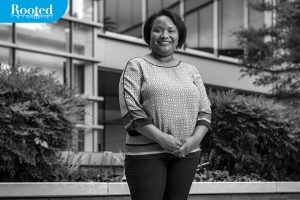Ashley Leak Bryant has been contributing to research at Carolina for 19 years.

Ashley Leak Bryant has worked for UNC-Chapel Hill for 19 years in a variety of roles, most recently as the Frances Hill Fox Distinguished Professor in the UNC School of Nursing. She is also the school’s senior associate dean for global initiatives and co-director of the Pan American Health Organization/World Health Organization of Quality and Safety in Nursing and Midwifery. As a member of the UNC Lineberger Comprehensive Cancer Center, she is the center’s assistant director of cancer research, training, and education coordination.
What brought you to Carolina?
I am a proud North Carolina native who grew up in Charlotte with my parents, sister, and a host of aunts, uncles, and cousins. My first experience at UNC-Chapel Hill was as a travel nurse in 2005 on the inpatient oncology unit, where I remained as a per diem nurse until 2020.
In my clinical work, I cared for patients with a variety of cancers and symptoms. Over time, I observed how little was known about enhancing the quality of life for patients with blood cancers, specifically adults with acute myeloid leukemia. I also realized that I lacked the research skills to develop and test interventions to improve this.
These experiences led me to pursue a PhD in nursing at the UNC School of Nursing (SON) in 2007. I completed the PhD program in 2011 and received an Interdisciplinary Certificate in Aging. I then completed a two-year postdoctoral fellowship at the UNC Gillings School of Global Public Health and started as an assistant professor in SON in 2013.
How has your role here changed over the years?
I have transitioned from patient care to research to administration.
My research stems from my clinical practice settings including caring for patients with cancer in the hospital, older adults in a continuing care retirement community and in their home. These experiences culminated my desire to want to make a difference in these patients and their families’ lives.
My 2003 fellowship at the National Institute of Health Clinical Center in Bethesda, Maryland, intrigued my curiosity and strengthened my commitment as a cancer nurse researcher.
My research responds to the critical need to understand and improve interprofessional teamwork and care coordination during and beyond cancer diagnosis and treatment. I have received internal and external funding to support designing and testing palliative and supportive care interventions for older adults with cancer and their care partners. I routinely collaborate with physical therapists, occupational therapists, oncologists, pharmacists, and registered nurses.
Building and sustaining the oncology care force and workforce is critical. With an increasing number of cancer survivors in our state, nationally, and globally, it is imperative that our care teams mirror the racial, ethnic, and gender composition in our communities. In 2022, the SON and UNC Lineberger Comprehensive Cancer Center partnered with North Carolina Central University, a historically black university, to improve care for current patients and cancer survivors in urban and rural communities, areas that largely have been underserved.
I have also been engaged in global health opportunities since my undergraduate education and believe that global health is public health! Since 2022, I have led SON’s Global Initiatives Office to expand and meet the growing needs of our learners, communities, and scholars both in N.C. and around the world.
What’s kept you at Carolina?
The people and a culture of unwavering commitment to interprofessional collaboration. Carolina has an array of resources that enhance creativity and innovation, leading to transformative learning.
What contribution are you most proud of?
I am committed to mentoring future generations of nurses, scholars, scientists, and clinicians to advance cancer care globally. Service — and the desire to provide a net public good — is at the core of who I am and informs every aspect of my personal and professional work.
During my PhD program, I observed my peers, particularly international students, with limited research funding opportunities. This led me to contact the SON Advancement Office to discuss research and funding opportunities for international students. In 2011, the James and Patricia Leak Fund for Nursing Research was established, and since then more than 12 students have received funding to support their dissertation research.
What is a uniquely Carolina experience you’ve had?
Being acknowledged and recognized for my work in cancer care and global health. I would not have imagined I would be a distinguished professor with two administrative roles and a mentor to future generations.
Rooted recognizes long-standing members of the UNC-Chapel Hill community who have aided in the advancement of research by staying at Carolina. They are crucial to the UNC Research enterprise, experts in their fields, and loyal Tar Heels. Know someone we should feature? Nominate a researcher.